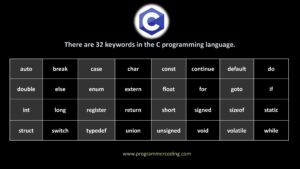Keywords in C language are reserved words defined before definitions and functions in C programming language. Because these elements are reserved by the language for special purposes, they cannot be used as symbols such as variable names, function names, or letters.
Here are some examples of C language keywords

- auto: This keyword automatically declares a variable; This means that the variable is local to the block and is destroyed at the end of the block.
Syntax
auto int num = 10;
- break: It is used to break the loop or change the expression it is in.
Syntax
for (int i = 0; i < 10; i++) {
if (i == 5) {
break;
}
printf(“%d “, i);
}
- case: This keyword is used to modify sentences to indicate different situations.
Syntax
switch (num) {
case 1:
printf(“One”);
break;
case 2:
printf(“Two”);
break;
default:
printf(“Other”);
}
- char: It is a fundamental data type that represents characters.
Syntax
char ch = ‘A’;
- const: Declares a constant, that is, a variable whose value cannot be changed.
Syntax
const int MAX_SIZE = 100;
- continue: It is used to skip the current iteration of the loop and continue to the next iteration.
Syntax
for (int i = 0; i < 10; i++) {
if (i == 5) {
continue;
}
printf(“%d “, i);
}
- default: Shows status on transition notification.
Syntax
switch (expression) {
case constant_expression1:
// Statements
break;
case constant_expression2:
// Statements
break;
default:
// Statements
}
- do: Start do-while loop.
Syntax
do {
// Statements
} while (condition);
- double: interprets double precision floating point data.
Syntax
double variable_name;
- else: Shows other events in the description.
Syntax
if (condition) {
// Statements
} else {
// Statements
}
- enum: Define the enumeration type.
Syntax
enum enum_name {
constant1,
constant2,
// More constants
};
- extern: Declare variables and functions defined in other files.
Syntax
extern data_type variable_name;
- float: defines single precision floating point data.
Syntax
float variable_name;
- for: Start the cycle.
Syntax
for (initialization; condition; iteration) {
// Statements
}
- goto: Transfer control to the specified message.
Syntax
goto label_name;
- if: It is the starting statement.
Syntax
if (condition) {
// Statements
}
- int: Interpret the data number.
Syntax
int variable_name;
- long: defines the file length integer.
Syntax
long variable_name;
- Register: Tells the compiler that changes should be stored in registers.
Syntax
register data_type variable_name;
- return: Exits the function and returns the value.
Syntax
return expression;
- short: Define short integer data type.
Syntax
short variable_name;
- signed: Defines a type of signature file that can store positive and negative values.
Syntax
signed data_type variable_name;
- sizeof: Returns the size of a data type or variable.
Syntax
sizeof(data_type); or sizeof(variable);
- static: Declare variables and function as static.
Syntax
static data_type variable_name;
or
static return_type function_name(parameters);
- struct: Definition of structure.
Syntax
struct struct_name {
data_type member1;
data_type member2;
// More members
};
- switch: Start a spreadsheet to select one of many blocks of code to process.
Syntex
switch (expression) {
case constant1:
// Statements
break;
case constant2:
// Statements
break;
default:
// Statements
}
- typedef: Identify the new file using the namespace
Syntex
typedef data_type new_data_type;
- Union: Definition of the union type.
Syntex
union union_name {
data_type member1;
data_type member2;
// More members
};
- unsigned: Identifies the unsigned file type.
Syntex
unsigned data_type variable_name;
- void: Custom function does not return a value.
Syntex
void function_name(void) {
// Statements
}
- Volatile: Indicates that the variable can be changed by external sources.
Syntex
volatile data_type variable_name;
- while: Initiates a while loop.
Syntex
while (condition) {
// Statements
}

Best learning platform..